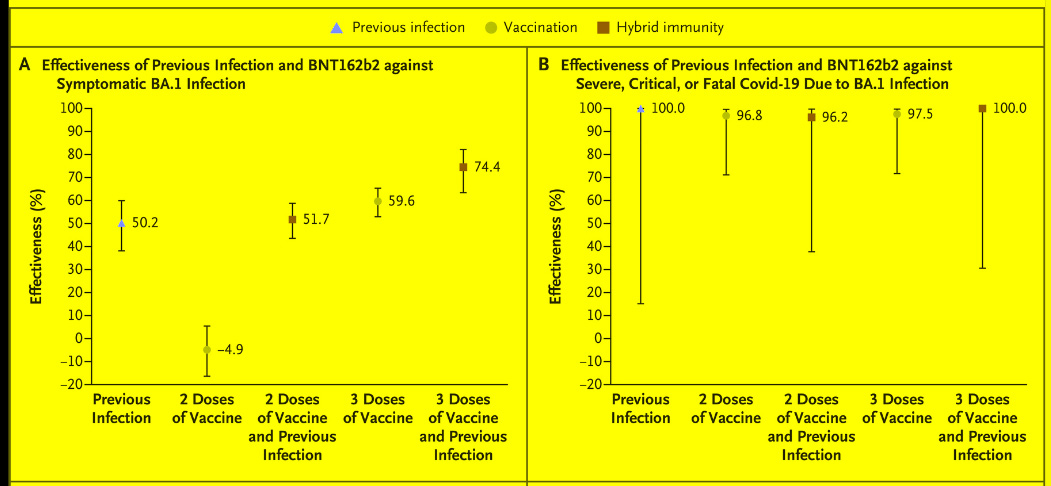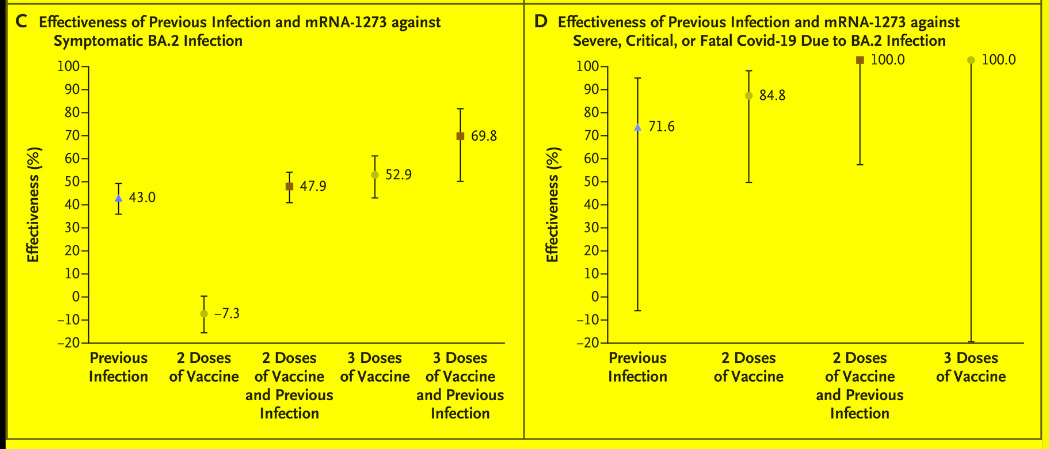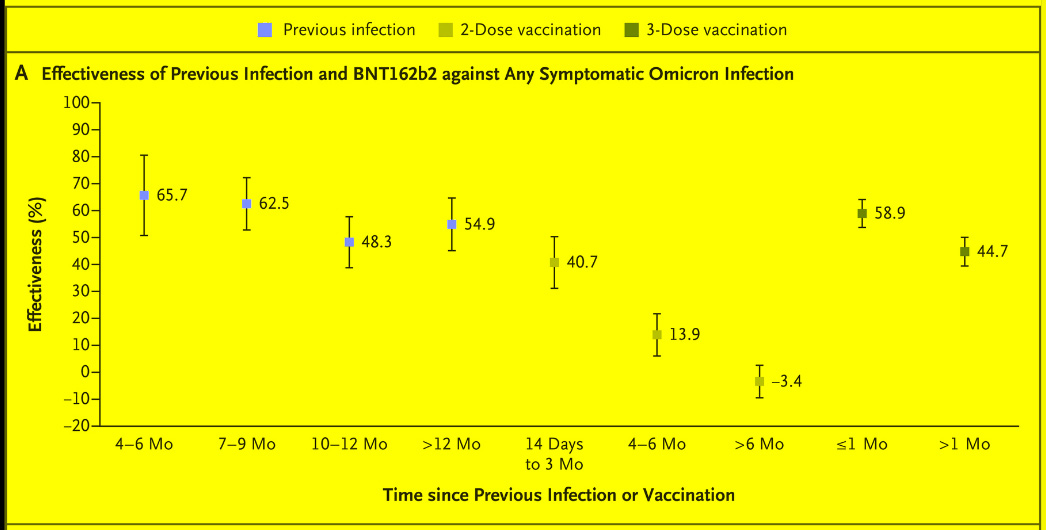A new study shows natural protection still good at 50% after ten months, while vaccination protection waned after 4 months
The utter scandal here is that all those people who had natural protection were being forced to take vaccines to protect them from Omicron, when the vaccines were providing only a fairly limited benefit or no advantage at all.
A new study was based on the whole population of Qatar. It shows that people who caught the original older variants had about 50% immunity to catching Omicron — even ten months later. Those who were double vaccinated had so little protection six months later, it was effectively zero. Indeed, if they had Pfizer their effectiveness was minus 3.4% meaning they were ever so slightly more likely to catch Omicron that if they hadn’t had any vaccines. For moderna it was minus 10% at the six month mark, which sounds, well, not good.
Ten months later, those who had caught earlier variants of Covid still had 50% protection against Omicron:
Vaccination Increases Risk of COVID-19 Infection, But Infection Without Vaccination Gives Immunity: Study
Marina Zhang, Epoch Times
The authors of the study found that those who had a prior infection but no vaccination had a 46.1 and 50 percent immunity against the two subvariants of the Omicron variant, even at an interval of more than 300 days since the previous infection.
Immunity levels for two COVID-19 vaccines fell to negative figures 270 days after the second dose of vaccine. These numbers predict a trend of more rapidly waning immunity for vaccines compared to immunity from infections.
The findings are supported by another recent study from Israel that also found natural immunity waned significantly more slowly compared to artificial, or vaccinated, immunity.
The study found that both natural and artificial immunity waned over time.
Individuals that were previously infected but not vaccinated had half the risks of reinfection as compared to those that were vaccinated with two doses but not infected.
Natural protection was as good as three doses for outcomes that mattered
From the paper, the first box below compares people taking Pfizer or catching old versions of Covid and their later likelihood of catching Omicron BA1. Basically two doses were useless and once someone had caught covid they’d need at least three doses before there was much benefit above and beyond what they already had, and when we say “benefit” we’re only talking about a reduction in symptomatic Covid.
The box on the right shows just how useful any kind of protection was against severe, critical or deadly outcomes. Remarkable stuff. 100% everywhere.
Bear in mind that the third dose “boosted” people were usually were still in the seven week honeymoon period. If this study were done now, a few months later, the 3 doses numbers here might not look much different to the other options, or possibly, might resemble the “2 dose” poor results. We can’t tell from this study.

Fig 1. AB NEJM (Click to enlarge)
The numbers are similar for the newer variant of Omicron called BA2 but protection was a bit lower (below). Meaning the the newer Omicron version which took over the world in January was slightly better at evading protection than the December one. BA2 was definitely a bit nastier for some people though. And protection against severe, critical or fatal BA2 infection was lower from natural infection, though monster error bars neutralize all simple statements.

Fig 1.CD NEJM (Click to enlarge)
All the figures are slightly out of date though. We’re now up to Omicron 4 or 5 or so.
Tracking the slide
The honeymoon period for vaccination lasts for three months and then wears off quickly to the point where at six months the injectee might as well not have had a dose at all.

Fig 3. NEJM (Click to enlarge)
It also has to be said we don’t know if catching Omicron protects a lot against catching Omicron. It does for a while, but we don’t know how long. It’s possible that a mild case of Omicron doesn’t set people up for long term great protection, which is what happens with other normal mild coronaviruses at the moment.
Participants and Doses — Note that the third doses were very recent in this study
During the study period, 893,671 persons received two doses of mRNA-1273, and 135,050 of these received a third dose. The median date of the first dose was May 28, 2021, the median date of the second dose was June 27, 2021, and the median date of the third dose was January 12, 2022.
RESULTS
The effectiveness of previous infection alone against symptomatic BA.2 infection was 46.1% (95% confidence interval [CI], 39.5 to 51.9). The effectiveness of vaccination with two doses of BNT162b2 [Pfizer] and no previous infection was negligible (−1.1%; 95% CI, −7.1 to 4.6), but nearly all persons had received their second dose more than 6 months earlier. The effectiveness of three doses of BNT162b2 and no previous infection was 52.2% (95% CI, 48.1 to 55.9). The effectiveness of previous infection and two doses of BNT162b2 was 55.1% (95% CI, 50.9 to 58.9), and the effectiveness of previous infection and three doses of BNT162b2 was 77.3% (95% CI, 72.4 to 81.4). Previous infection alone, BNT162b2 vaccination alone, and hybrid immunity all showed strong effectiveness (>70%) against severe, critical, or fatal Covid-19 due to BA.2 infection. Similar results were observed in analyses of effectiveness against BA.1 infection and of vaccination with mRNA-1273.
Prior infection only = 46%
Two doses only = -1.1% (essentially no protection at all)
Three doses (only) = 52%
Infection plus two doses = 55%
Infection plus three doses = 77%
REFERENCE
Heba N. Altarawneh, M.D. et al (2022)Effects of Previous Infection and Vaccination on Symptomatic Omicron Infections, NEJM, https://www.nejm.org/doi/full/10.1056/NEJMoa2203965?query=featured_home